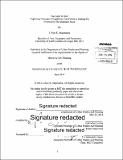Too legit to quit : exploring concepts of legitimacy and power in scaling-up community development work
Author(s)
Steponaitis, Lillian K. (Lillian Kazimiera)
DownloadFull printable version (3.464Mb)
Alternative title
Too legitimate to quit : exploring concepts of legitimacy and power in scaling-up community development work
Exploring concepts of legitimacy and power in scaling-up community development work
Other Contributors
Massachusetts Institute of Technology. Department of Urban Studies and Planning.
Advisor
Gabriella Carolini.
Terms of use
Metadata
Show full item recordAbstract
Community-based organizations are unique in that their success is based not only on the services they offer, but also their more intangible networks of trust, robust local relationships, and on-the-ground knowledge of community needs. As local organizations grow and seek to replicate themselves, the question of local trust and participation, the very basis of their legitimacy, is sometimes challenged. Legitimacy speaks to program success, the continuation of healthy community relationships, and sustained local representation in the organization. Although legitimacy is a concern for growing organizations in the communities they expand to, claims on legitimate leadership and organization begin at home. This paper examines the case of Banco Palmas, the first community organized bank in Brazil, to address the question of how the changing relationships of scale affect Banco Palmas's ability to effectively engage with, and thus legitimately represent, the residents of the neighborhood of Conjunto Palmeiras. Based on information gathered through fieldwork at Banco Palmas and drawing from the literature on empowerment, it is argued the struggle for legitimacy plays out not only between the Palmas organizations and the local residents association, but also in how new members and non-members interact with and participate, or do not participate, in bank activities. These struggles are born out of a discontinuity between personal empowerment and broader community organizing efforts, particularly as they apply to young people and new members. The case points to the importance of linking personal politicization and empowerment to collective organizing through new methods of online engagement.
Description
Thesis: M.C.P., Massachusetts Institute of Technology, Department of Urban Studies and Planning, 2014. Cataloged from PDF version of thesis. Includes bibliographical references (pages 63-66).
Date issued
2014Department
Massachusetts Institute of Technology. Department of Urban Studies and PlanningPublisher
Massachusetts Institute of Technology
Keywords
Urban Studies and Planning.